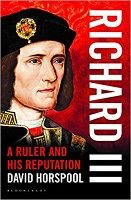Richard III: A Ruler and his Reputation - David Horspool

Richard III: A Ruler and his Reputation - David Horspool
Non-Fiction
Pages: 336
It was inevitable that the rediscovery of Richard III's bones in Leicester in 2012 would result in a wave of new titles about England's most controversial king cashing in on the public interest. But this is one of the more balanced looks at Richard III I've ever read (and as a card-carrying member of the Ricardian Society I've read a few!) - and for that alone I have nothing but praise for David Horspool. For good or bad almost all biographies of Richard III tend to look at his life and reign through the prism of the 'Princes in the Tower' mystery, as though everything in his life before inevitably led up to that moment and everything after was defined by it. Lives are not lived this way; no act is inevitable; and we cannot led hindsight colour how we view Richard's actions before he became king, as though we can tease out the approaching evil through his words and deeds.
David Horspool sets out neither to vilify or whitewash Richard, but to to assess him as a man and as a king within the context of his time and his own actions. And much of the history of Richard III does not lead us inexorably to his acts of usurpation and (potentially) murder; for most of his life Richard was the ultimate loyal royal servant, in stark contrast to his elder brother Clarence. It is unlikely therefore that Richard always intended to usurp the throne upon his brother's death. Perhaps he was impelled by events, perhaps he felt his own life and that of his wife and child to be in danger, perhaps the temptation was just too great to resist.
Did he kill his nephews? Horspool's conclusion is that, on the balance of probability, yes, he likely did. And it is entirely possible that that act contributed to the instability and final failure of his reign as king, but this failure was not inevitable either. Richard III never faced a wholesale revolt of his barons, could still draw on significant support to face the invasion of Henry Tudor. The Battle of Bosworth could have gone either way, battles often turn out contrary to expectations, and had Richard won the day it was unlikely that any resistance or rebellion against his reign could have been sustained long term, with no more royal alternatives at hand. Had Richard III lived and married and fathered another son, had his reign prospered, would we remember him now as the black legend of Shakespeare's fame, even with the murder of the princes? Doubtful. After all, Henry I probably killed his own brother, John murdered his nephew too, Henry IV had Richard II put to death, Edward IV executed his brother and had Henry VI killed, and as for Henry VIII...
What is perhaps more interesting, as Horspool explores in his final chapter, is that 'the history has not changed very much as a consequence of the discovery, but the perception of Richard may have done'. The public interest in his discovery, the grand reinterment staged at Leicester Cathedral, the pomp and pageantry, the tacit acceptance of crown and church by the presence of royalty and senior clergy at the ceremonies - all were very much more than were accorded the supposed bones of the Princes in the Tower when they were discovered in the seventeenth century. Many are more inclined to give Richard 'the benefit of the doubt' regarding the murders. Of course, there is a danger in going too far and attempting to portray Richard as little short of a saint, maligned throughout history unfairly. Whatever he was, he was no saint, but a medieval magnate and king in a turbulent and violent era. What motivated Richard is lost to history, but his actions remain - and he became king in place of his nephew, Edward V.